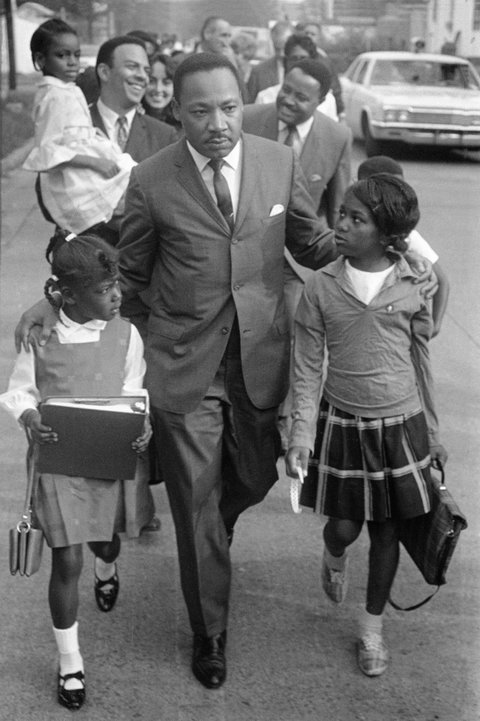We’re now two weeks past MLK day. We have no voting rights bill, yet another example of Mitch McConnell telling on himself and a whole bunch of facile social media content about The Dream.
Dr. King’s legacy and Dream, vital as ever, retains its power for a better tomorrow. At the same time, its decades of deployment in the name of empty virtue signaling and even well-intentioned allyship risks its essentialization, warping it into a totalistic “color blind” vision that ignores–willful or not–the nuance and complexity that our Brother, Dr. Martin Luther King, actually championed.
Look no further than his perspective on school integration. Far from fully embracing the legacy of Brown vs. Board of Education, Dr. King was profoundly skeptical of the ability of our public school system to actually make good on the promise underlying the Brown decision.
His own words make that clear:
I favor integration on buses and in all areas of public accommodation and travel.
I am for equality.
However, I think integration in our public schools is different. In that setting, you are dealing with one of the most important assets of an individual — the mind.
White people view black people as inferior. A large percentage of them have a very low opinion of our race.
People with such a low view of the black race cannot be given free rein and put in charge of the intellectual care and development of our boys and girls.
Our work at the Center for Black Educator Development is a direct line from Dr. King’s recognition of the inherent challenges that would attend the integration of public schools in 1950s, 1960s and 1970s America. His critique rings as true today as it did then: educator biases about their abilities and aptitudes are a first order barrier to the success of Black and Brown children. Our public schools are now majority students of color, but nearly 80 percent of teachers are white, most of whom acknowledge they have not been adequately prepared to teach in Black and Brown schools and communities. School superintendents (mostly white) also note that they are woefully unprepared to discuss race – so how will they lead with equity? We remain still, to this day, agonizingly close to the state of things that Dr. King observed.
Thankfully, we know what to do about it and we’re starting to actually do it.
A growing body of literature, studies, and experimental research is showing the extent to which educator bias lowers the trajectory of Black and Brown children. At the same time, we see an emerging consensus on the power and potential of Black and Brown educators, as well as educators of all backgrounds who are equipped with the necessary cultural competencies, to help propel Black and Brown student learning and life outcomes.
My own education background is a powerful testament to the impact of a positive racial identity and an environment that is centered on the potential of Black and Brown children. Nidhamu Sasa, the Afrikan Free School founded by the Black Humanist Foundation in the Germantown section of Philadelphia, was not just a refuge for me and my classmates, it was training for a world that would daily threaten the safety and wellbeing of the Black and Brown child. It provided me the armor and tools to fend off the intellectual abuse and assault that flows from a world of institutional and individualized racism.

At the same time it was a place of rigorous learning for all, even the youngest learners. The 3 and 4 year olds were learning literacy and numeracy skills at a time when the prevailing orthodoxy was that it was too much for children of that age. Black girls were taught they could be President, Black children were shown what it meant to be a servant leader and we all were raised to believe that positive self-identity, community organizing, hard work and self-determination were powerful tools to fight against systemic racism. As Baba Changa, our martial science and history teacher used to say, “This isn’t Coney Island, we work hard here. The enemy doesn’t rest.”
Fast forward to today and the early childhood education space is replete with play-based work around exactly those skills that my classmates and I were learning in the late 1970s and early 1980s. Our public education system is awash in programs and initiatives to build the kind of positive identity and resilience that was at the core of all we experienced. We graduated from Nidhamu Sasa smarter, stronger, kinder, more empathetic, and more connected to our world.
Which is why at the Center for Black Educator Development we are so committed to our work and approach it with urgency.
We know the power of breaking from the constraints of a system of public education that is dominated by low expectations for Black and Brown students. We know the potential of Black and Brown children if they are supported by educators who understand, see and know them as the talented and capable people that they are.
And we know, as Brother Martin said, “change not rolling on the wheels of inevitability, but comes through continuous struggle.”
#PamojaTutashinda


[…] here is important. One relevant and vital observation is that civil rights leaders’ desire for school integration—for access to better-funded schools—was not driven by a wish to escape Black teachers. Black […]
[…] spoke about is what we’re still fighting. And his message goes way beyond little Black children going to school with little white […]